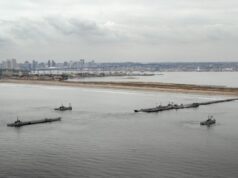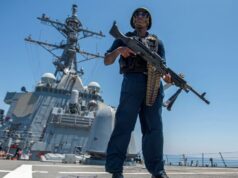The United Arab Emirates restarted its attacks on Tuesday, just a few days after the country announced it would deploy F-16s to Jordan. The Emirates’ official news agency WAN said Abu Dhabi “reaffirms the UAE’s unwavering and constant solidarity” with Amhan. However, even with enthusiasm among its Arab allies, the U.S. still plays a pivotal role in fighting IS.
The UAE quietly suspended air strikes in December, fearing the limited capacity of coalition forces to reach a downed pilot, following the capture of Jordanian pilot Moaz al-Kasasbeh. To reassure its allies, the U.S. military reportedly repositioned V-22 Osprey tilt rotor aircraft and additional troops from Turkey to northern Iraq in preparation for such search-and-rescue missions. But it was the death of al-Kasasbeh that galvanized Jordan and the UAE to increase their offensive positions.
Over the weekend, the chief of the Jordanian Air Force announced that the kingdom had launched 56 airstrikes in Iraq and Syria. U.S. F-22 Raptors now regularly escort Jordan fighters, likely providing forward targeting assistance. Jordanian officials estimated that approximately 7,000 IS fighters have been killed since the start of coalition bombing in August and promised to continue their “earth-shattering” response to al-Kasasbeh’s execution.

A UAE F-16. (Photo: AFP) |
While U.S. leaders claim airstrikes have made progress, it was Kurdish troops on the ground that recaptured Kobane, a symbolic more than strategic objective. U.S. officials signal that an intensive ground campaign will also be needed to retake Tikrit, Fallujah, and Iraq’s second largest city, Mosul. The U.S. military is continuing to train Iraqi forces for that role as well as working with Kurdish forces, and has begun formulating operations to take back strategic areas near larger cities. However, military planners expect house-to-house urban warfare, where air support is limited at best (and creates tremendous collateral casualties at worst) to pose the most significant challenges to Iraqi troops.
Even as Arab states make progress fighting IS, strong and continuous backing from the U.S. remains necessary, and the role of ground troops – American or allied – is central to the plan.





